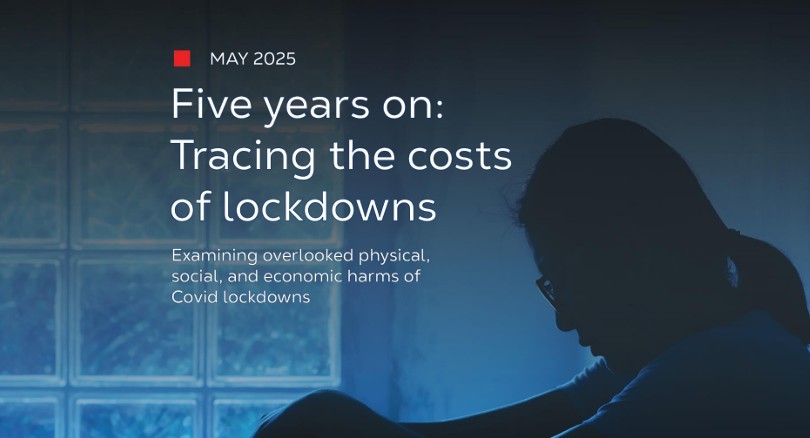CALGARY, AB: A new report from the Justice Centre for Constitutional Freedoms examines the immediate and long-term negative impacts of Covid lockdowns, including physical, social, and economic harms. It also underscores the lack of transparent, evidence-based analysis by governments to justify these measures.
The report details how policies introduced with the stated goal of saving lives came at an extraordinary cost to Canadians’ mental and physical health, access to healthcare, economic security, and civil liberties.
One of the most concerning findings is the sharp decline in Canadians’ mental health. In 2019, 67 percent of Canadians rated their mental health as “very good or excellent.” By 2023, that figure had dropped to just 54 percent.
Meanwhile, the number of Canadians reporting “fair or poor” mental health nearly doubled—from 8 percent to 15 percent. This trend was seen across all age groups, but especially among young adults.
Indeed, despite facing minimal risk from Covid, young Canadians suffered some of the most serious consequences of lockdown measures. Non-Covid deaths among Canadians under age 45 rose by 22 percent, driven by factors such as disease, addiction, delayed treatment, and suicide. Physical activity among youth dropped significantly during this period, while time spent on screens—such as cell phones, computers, and tablets—increased sharply. Up to 70 percent of children and teens reported experiencing anxiety, depression, or other serious mental health issues.
A particularly alarming trend was the surge in opioid-related deaths. From 2020 to 2023, annual opioid overdose deaths increased by 108 percent. In 2023 alone, 8,606 Canadians died from opioid toxicity—more than double the pre-lockdown average. British Columbia, Alberta, and Ontario recorded the highest rates, with the vast majority of deaths involving fentanyl.
During Covid, thousands of medical check-ups, diagnoses, and treatments were delayed or cancelled, resulting in a serious and ongoing backlog in Canada’s healthcare system.
Wait times for medical treatments increased by 43 percent between 2019 and 2024, reaching a median of 30 weeks. MRI wait times rose by 55 percent. For certain cancers, including breast and prostate, surgery delays increased by as much as 34 percent. Since 2018, more than 74,000 Canadians have died while waiting for surgery or diagnostic care—over 15,000 of them in 2023–24 alone. The actual number is likely higher, due to poor provincial tracking and reporting.
The economic impact was equally severe. Lockdowns resulted in widespread job losses, particularly among low-wage workers, while the “laptop class” remained largely unscathed. While many public sector jobs expanded during this time, Canadians in hospitality, retail, and service sectors faced prolonged unemployment. The expansion of public spending and government debt contributed to rising inflation, driving up the cost of food, housing, and other essentials.
Crime rates also rose during the lockdown years. Homicides peaked in 2022 at 17 percent above trend, with 882 victims across Canada. Cybercrime nearly doubled, rising from 48,000 cases in 2019 to over 93,000 in 2023. Identity theft and fraud increased to 120 percent above trend in 2020, with similar levels in the following years. Particularly troubling was the rise in online child sexual exploitation, which reached 18,650 reported cases in 2023—a 173 percent increase from 2019.
Benjamin Klassen, Education Coordinator at the Justice Centre, says the findings demand accountability. “This report calls for governments to take responsibility for the damage done during this period and ensure that future public health policies uphold the Charter rights and freedoms of all Canadians.”
Mr. Klassen continues, “The Charter requires governments to ‘demonstrably’ justify any freedom-limiting policy. To date, no federal or provincial government in Canada has conducted the kind of comprehensive impact assessment required to justify the lockdowns.”
He concludes, “The evidence is clear: the harms of lockdowns outweighed their benefits. Canadians deserve an honest and transparent evaluation of lockdown harms, so that these mistakes are never repeated.”








